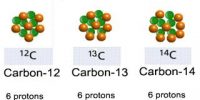A chemical equation is a shorthand description of the changes that occur in a chemical reaction such as
Methane + Oxygen → Carbon Dioxide + Water
It allows us to determine the quantitative relationships between reactants and products. To be valid, a chemical equation must be:
- Consistent with the experimental facts. Just because one can write an equation, it does not mean that it can really happen.
- Consistent with conservation of mass i.e. the total number of atoms of each element in the reactants must be equal to the total of the products. Atoms cannot disappear!
- Consistent with conservation of electric charge i.e. the net charge, before and after, must be the same
To construct a chemical equation for a reaction:
- Write the names of the reactants on the left and products on the right side of the arrow,
- Replace the names with the correct chemical formulae,
- Balance the equation, and
- Write the state symbols after each substance: (s) solid, (g) gas, (I) liquid and (aq) aqueous.












